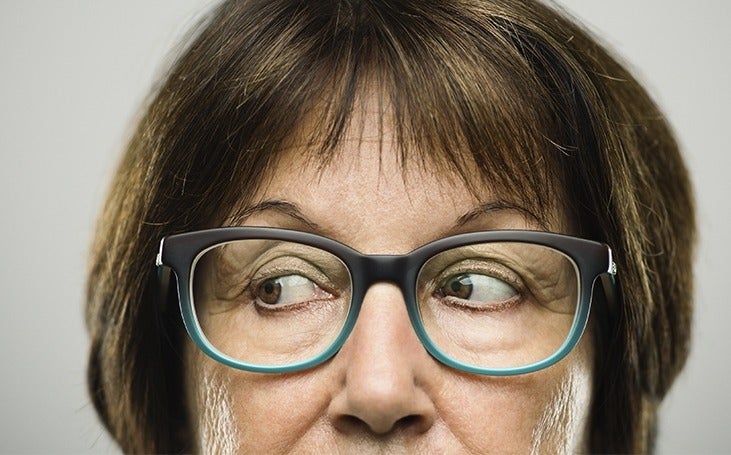10 Vision Symptoms to Look for as You Age

It’s inevitable. Over the years, your vision will be one of the first noticeable signs of aging. While vision changes are a normal part of life, there are many preventive measures you can take to lessen the impact of aging eyes.
Age-related vision issues to look for (And what to do about them!)
Many of the following vision problems are common and can often be easily treated. It’s important to talk to your doctor because sometimes these conditions can be signs of more serious medical issues.
1. Presbyopia: Difficulty seeing close objects or small print.
- Prevention Pro Tip: Reading glasses usually fix the problem.
2. Floaters: Observing tiny specks or "cobwebs" that float across your vision? This is common but sometimes a sign of a more serious vision problem such as retinal detachment.
- Prevention Pro Tip: If you see many new floaters and/or flashes of light, see your doctor right away. This is a medical emergency.
3. Tearing: Having too many tears. This is often caused by light sensitivity, wind, temperature changes, or dry eyes.
- Prevention Pro Tip: Wearing sunglasses or using eye drops may help.
4. Eyelid problems: Experiencing symptoms such as red and swollen eyelids, itching, tearing, and crusting of eyelashes during sleep can be caused by different conditions.
- Prevention Pro Tip: Warm compresses and gentle eyelid scrubs may be able to help.
5. Cataracts: Cloudy areas in the eye’s lens causing blurred or hazy vision. Some cataracts stay small and don’t change your eyesight much, while others become large and reduce vision.
- Prevention Pro Tip: If you have a cataract, your eye care professional will watch for changes over time to see if you would benefit from surgery.
6. Corneal conditions: Symptoms include watery eyes, redness, pain, problems with vision, or a halo effect.
- Prevention Pro Tip: Changing your eyeglass prescription or using eye drops may help. Speak to your eye doctor. In severe cases, surgery may be needed.
7. Dry eye: Symptoms include itching, burning, or other discomfort.
- Prevention Pro Tip: Your doctor may recommend a home humidifier, special eye drops, or ointments to treat dry eye.
8. Glaucoma: Too much fluid pressure inside the eye. If not treated, it can lead to vision loss and blindness. People with glaucoma have no early symptoms or pain.
- Prevention Pro Tip: Protect yourself by having regular dilated eye exams. Glaucoma can be treated with prescription eye drops, lasers, or surgery.
9. Age-related macular degeneration (AMD): AMD can harm the sharp vision needed to see objects clearly.
- Prevention Pro Tip: If you have AMD, ask your doctor if special dietary supplements could lower your chances of the disease worsening.
10. Diabetic retinopathy: Develops slowly and with no early warning signs. May occur if you have diabetes.
- Prevention Pro Tip: Keeping your blood sugar under control can prevent it or slow its progress. Laser surgery can sometimes prevent it from getting worse.
Protect your vision as you age
One of the best things you can do to protect your eyes is to have a yearly eye exam. Your doctor will most likely use eye drops to dilate your pupils to look for common eye diseases that have no early signs. If you wear glasses, your prescription would most likely be checked at your appointment. Checking for diseases like diabetes or high blood pressure is also important as these diseases can cause eye problems if not treated.
Resources & Tools
Drug Search
Use the drug search tools to find out if your drugs are covered and which tier they fall under on your plan type.
Find a Doctor
Find a doctor within your Tufts Health Plan Medicare Preferred HMO network or your Tufts Health Plan Senior Care Options network.
Health Library A-Z
Tufts Health Plan has partnered with Healthwise to provide members with access to a library of high-quality content on conditions, treatments and more.